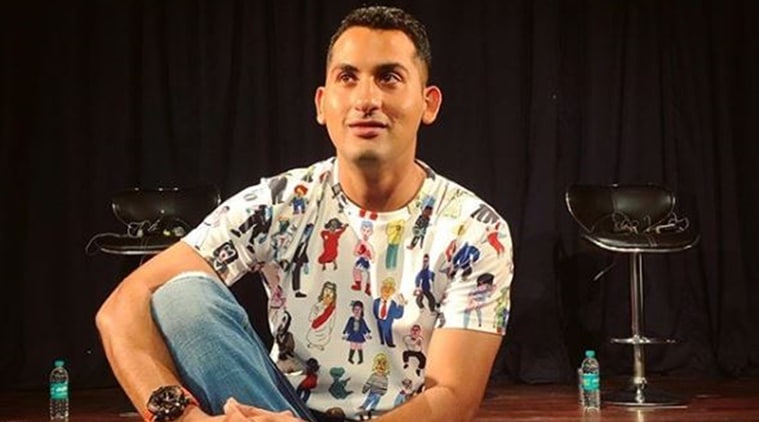 ‘I have always had a fascination for voices, accents and characters,’ says Sait. (Photo: danish Sait/ Instagram)
‘I have always had a fascination for voices, accents and characters,’ says Sait. (Photo: danish Sait/ Instagram)
“Bro, He is too Hindi, no?”
“No dude, we are too south Indian!”
The quickest, most entertaining dissection of Prime Minister Narendra Modi’s May 12 speech announcing lockdown 4.0 was not by a raging TV news anchor but an actor-comic in Bengaluru speaking into a yellow paintbrush. Danish Sait, whose viral conversations with imaginary friends have been the discovery of the lockdown, wondered if there could be a “skip-intro button” to the PM’s speech, before asking, “Macha, what is aatmanirbharta?”
Sait was speaking for a cohort of south-of-Vindhyas citizens flummoxed by the PM’s Hindi, but if there is one person who has aced lockdown goals of self-reliance, it is this 32-year-old comic who has as many accents in his repertoire as Bengaluru autorickshaw drivers have excuses not to go anywhere. The baby-faced actor has been morphing into an ensemble cast of characters, who pop up in his immensely popular short videos to chat about lockdown blues. They are all glued to the phone — which could be a box of tissues or a Persian cat, a bottle of wine or a pack of chips, all repurposed into aatmanirbhar props.
Who are these people? Bro, you must have recognised the old boys of Bengaluru’s convent schools in these sketches, da! From trying to cadge a bottle of alcohol from uncle in a “military canteen” to racing to “put one kerchief” in the queue in front of the wine store, they are all there. There is the chettan of Family Supermarket, a loving hat-tip to the Malayali owners of city department stores and their phlegmatic response —“aah” — to all kinds of customers life throws their way. “From Dubai to Bengaluru, every supermarket conversation goes like that. What does that aah mean? I haven’t been able to figure out,” says Sait. There’s Jaya, the domestic worker, whose didi has realised her worth in two months, and whose always-sloshed husband has found some serious online fandom. There’s the redoubtable Razia, whose robust “thoo, bewarsi” is the full-bodied rebuff of a closet feminist. Also playing: the love story between Pyaari Bakhri and Gopal the Goat that has set several heartbeats aflutter.
“I have always had a fascination for voices, accents and characters,” says Sait. As a child, he recalls hanging out with his sister, the actor Kubbra Sait, at a department store his mother owned and soaking up the many kinds of people who would walk in, their verbal tics and odd singsong voices. It also helped that his mom Yasmin, who makes an appearance in one of the videos, is also “an unbelievable mimic”. “My mother would press the recorder button and say, speak. My sister and I would blabber into tape after tape, making up voices and stories. In some ways, this is just an extended childhood,” he says.
It was on the radio that his voice became famous, long before Sait did. In 2011, an FM channel started a show that became a Bengaluru cult. It involved a series of men calling clueless listeners to play pranks on them. There was the Dakhani-speaking waiter from Shivajinagar, who called a vegetarian customer to tell him that he had been served chicken Manchurian; and a wheedling receptionist congratulating a sperm donor on becoming a father. All those men — Nograj, Asghar, Charles, Abdullah and Manjunath — were the creations of Sait, the ventriloquist. “I have called people and told them I have put petrol in your diesel car, or told someone I am madly in love with your daughter and I want to elope with her,” he says.
A big fan of the work of British comedian Sacha Baron Cohen, Sait realised that the mad success of the prank show — you can still find entire shows uploaded on YouTube — and especially Nograj, the corrupt politician, was a sign that he had to move to a bigger platform. “Nograj is someone you can find in Vidhan Soudha, who speaks English even if he doesn’t know how to, who can say the most inappropriate things, and who prides himself on making money,” says Sait. Humble Politician Nograj released in 2018, cementing the cult of Nograj.
In some ways, the nimble-footed jugglery of accents and thoughts that Sait pulls off is a Bengaluru thing — long-time residents of this multilingual city have been known to carry on conversations in three languages at once. Sait speaks “Kannada, Tamil, Malayalam, Hindi, English, a little bit of Telugu, Urdu. And Kodava takk, too, from my boarding school days in Coorg.” The sketches might be about a worldwide experience of confinement, but they get their zing from being “vocal about local”.
What they also do is laugh at the privileged — their obsessions and conspiracy theories, heroes and villains. While he stays away from contemporary politics, Sait sneaks in comments about class and Islamophobia. But most of all, in the sketches featuring the feisty Razia and her orange-bearded religious-minded brother, we see characters refusing to be victims, but laughing at themselves and the world. Stereotypes, yes — but made of flesh, blood and wit. “Comedy should always punch up, not down. I don’t want to ever make the weak feel weaker,” he says.